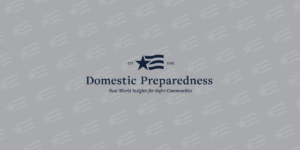

Protecting Special Events Amid Civil Unrest
Catherine L. Feinman
June 25, 2014
An article, a flash poll, and a podcast each addressed the same question: Can a country that faces
daily civil disturbances adequately secure a major special event? Many factors involved in training
public and private security personnel make this question difficult to answer – temporary staff, types of
training, and level of training to cite a few.

Training for Special Events – Keeping Them Safe & Secure
Richard Schoeberl
June 25, 2014
To address the gaps and concerns revealed in a recent article and flash poll, subject matter
experts discussed training efforts necessary to ensure adequate security at large-scale special events.
The challenge of securing special events can be compounded by daily responsibilities, especially where
civil violence exists.

Identifying Pre-Attack Indicators for Special Events
Jessica A. Gladfelter and Dallas R. Mosier
June 18, 2014
Elliot Rodger left many clues about his deadly intentions before killing six university students, injuring 13 others, and ultimately killing himself. Numerous threatening videos, a 140-page manifesto, and vague verbal threats were all pre-attack indicators. Although only hindsight is 20/20, such indicators should provide clearer vision when searching for potential future threats.

A Blossoming Public-Private Partnership
Catherine L. Feinman
June 18, 2014
For any large-scale special event, it is important to expect the unexpected. The United States Park Police took the time to plan and train with private sector partners for the annual Credit Union Cherry Blossom Ten Mile Run to discover gaps and mitigate potential hazards and incidents that may present before, during, or after the event.

A Blossoming Public-Private Partnership
Catherine L. Feinman
June 18, 2014
For any large-scale special event, it is important to expect the unexpected. The United States Park
Police took the time to plan and train with private sector partners for the annual Credit Union Cherry
Blossom Ten Mile Run to discover gaps and mitigate potential hazards and incidents that may present
before, during, or after the event.

Public-Private Partnerships – Ensuring the Safety of the Public
Susan Collins
June 18, 2014
Events such as the Boston Marathon bombing highlight the need to prepare for the unexpected. On 3
April 2014, the United States Park Police held a first-of-its-kind tabletop exercise with event
organizers of the Credit Union Cherry Blossom Ten Mile Run. This podcast provides insights on the
importance of bringing external partners to the table during the special event planning process.

Special Events: Plan, Assess, Train & Exercise
Kay C. Goss
June 11, 2014
The Federal Emergency Management Agency (FEMA) provides valuable resources for those responsible for or involved in planning a special event. These resources provide information on planning the event, assessing the hazards and threats, training personnel and volunteers, and exercising based on lessons learned from past events.

Rehearsal of Concept – From Army to Civilian Use
Philip J. Beck
June 11, 2014
The extensive trainings conducted at military installations have inspired similar trainings for many civilian agencies. In 2013, the United States Park Police discovered the U.S. Army’s “”rehearsal of concept”” drill, which they successfully used to plan for the presidential inauguration and will use the same concept for the upcoming 4th of July.

Operational Tasks – Go With the Flow
Joseph Cahill
June 11, 2014
The U.S. Centers for Disease Control & Prevention (CDC) is changing the dynamics of public-private partnerships as they relate to medical countermeasures for public health threats. By using nontraditional partnerships, CDC is not only providing easier access but also reducing the time needed to dispense large quantities of antiviral drugs, thereby securing the overall health of the nation.

Security Training – From World Cup to Olympic Games
Richard Schoeberl
June 4, 2014
Read “Protecting Special Events Amid Civil Unrest,” by Catherine FeinmanListen to podcast “Training for Special Events – Keeping Them Safe & Secure“Security concerns over Brazil hosting the 2014 World Cup

